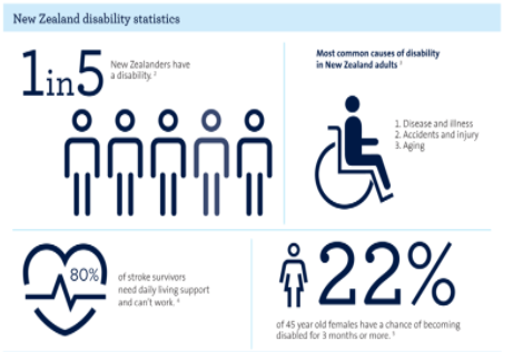Disability
Page updated: 28 December 2020
In future, given our continued ageing population, we can expect more people to be living with disabilities.
We might expect this to reduce demand for Search and Rescue services as disability tends to suppress outdoor recreation.
However, this demand reduction may not occur if government efforts to enable participation outdoors among people disabilities succeed. Similarly, if there are major technological breakthroughs that enable people with disabilities to partipate more outdoors, we could see more SAR demand.
More than a million kiwis are already living with disabilities
New Zealanders are living longer than ever before and spending more time in good health. But as the population ages, large numbers of people who identify as living with a disability grow too.
In 2013, 24 percent of the New Zealand population were identified as having a disability: a total of 1.1 million people (Statistics NZ 2014).
Approximately 35% of people with a disability are over 65 years old; that’s 370,000 people.
Disabled people are also more likely to have lower incomes than non-disabled people. Studies overseas (Burns and Graefe 2007), Sport NZ’s Active NZ data, and the New Zealand Office for Disability Issues have suggested that having a disability currently reduces participation in the outdoors.
We can expect a significant growth in disability while our population continues to age (at least until technology catches up).

Key New Zealand Disability Statistics (Stats NZ)
Disability and outdoor recreation
It is plausible to expect that rising disability will also reduce the demand for outdoor activity, with a flow-on impact on demand for SAR.
In a recent Active NZ Survey, ‘Poor health, injury or disability’ was listed as the third highest barrier to participation in sport and recreation, with about 10% of those surveyed affected by it.
However, with rising understanding of the importance of physical activity for the mental and physical wellbeing of those with (and without) disabilities, there is rising awareness and focus on ensuring that having a disability does not prevent people from enjoying the outdoors (Williams, et al. Summer 2004) (Jaarsma, et al. 2014).
On 11 October 2019, the New Zealand government announced an action plan to improve the wellbeing of New Zealanders with disabilities by addressing inequalities in play, active recreation and sport. The initiative involves $7 million with the aim of “establishing equity and ensuring disabled people across Aotearoa New Zealand can be just as active as non-disabled people.” (Sport NZ 2019).
If the government is successful, many more people with disabilities could be empowered to participate in the outdoors, improving their health and wellbeing. While this could be an excellent outcome, it could also mean that search and rescue services in future may have to consider the particular needs that those with disabilities may have when being rescued. This could, for example, have implications for both the kinds of equipment and training needed.
